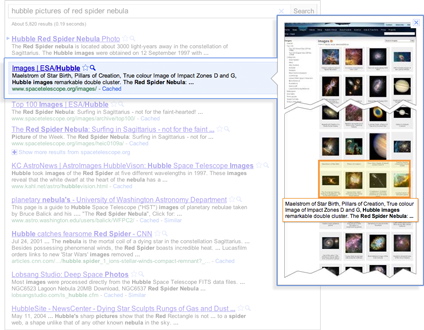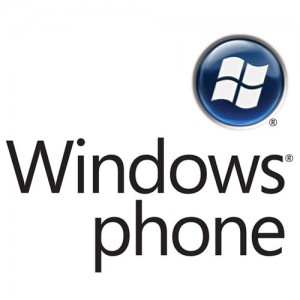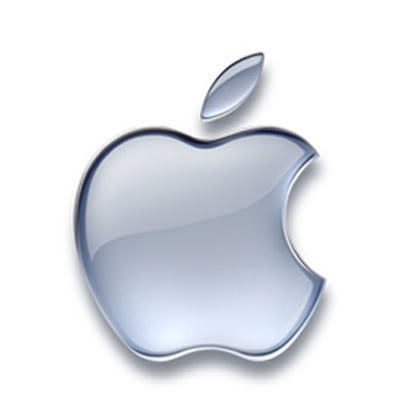
Google Instant Preview: making linked pages visible improves search
Google on Tuesday announced yet another upgrade to its search results pages intended to provide more information so that users don't haphazardly click away: Instant Previews. These previews are as simple as a small magnifying glass icon next to a search result, which users can click upon to see a visual snapshot of the linked site. These snapshots may also include search terms highlighted in orange where they appear in the resulting page. That's about it.
It's an understandable concept, and Google said on Tuesday that the feature increased users' satisfaction with search results by about 5% in internal testing.

Samsung adds second screen in new Android Galaxy S smartphone
Samsung today announced a new Galaxy S smartphone called the Continuum, which adds a secondary "ticker" screen beneath the main one, that can be activated simply by gripping the phone.
Not unlike Barnes & Noble's first generation Nook e-reader, there's a 1.8" almost-always-on touch panel mounted beneath the Continuum's 3.7" Super AMOLED screen. The ticker screen can be used to show RSS updates, incoming and missed messages, be used to launch widgets, or control calling and media player functions while the main screen is turned off.

Why did Steve Ballmer sell 12 percent of his stake in Microsoft?
Perhaps he knows something you don't.
I've been asking myself the question all weekend, and now I'd like to pose it to you. I ask Betanews readers to respond to the poll below and to answer in comments; please do both. You can choose up to two answers. I wanted to leave an option for your own reasons, but I worry that trolls would be obnoxious. Sorry. If readers respond favorably, I'll do more polls like this. The poll expires on October 16, 2010 at Midnight PT. Embedded poll below requires JavaScript. If you have disabled JavaScript or otherwise can't see the poll, please go to this link.

Windows Phone 7 hits US wireless carriers today
U.S. Wireless network operators AT&T and T-Mobile began selling their first three Windows Phone 7 devices today: the Samsung Focus, HTC Surround, and HTC HD7. These are the first of ten Windows Phone 7 launch devices to be made available to United States customers.
Today is an important day in the life of Microsoft's new mobile operating system; it's the first day it steps out into the U.S. smartphone market where Google's Android and Apple's iOS operating systems have been gaining momentum.

Why won't Wall Street give Microsoft a break?
Betanews reader Robert Johnson wants to know the answer to the question, which he asked me on Friday night. His short e-mail "I'm Confused About Microsoft" got me to reflecting again about Microsoft's performance under Steve Ballmer's executive leadership and the stock's moribund consistently sub-$30 over the last 10 years. Microsoft is a hugely profitable company that likely will be for many years, so why won't industry and Wall Street analysts and investors give Microsoft a break?
Before getting to Johnson's e-mail and my response to it, some context: Ballmer ascended to the chief executive's position in January 2000. In October of that year, Microsoft announced fiscal 2001 first quarter income of $2.58 billion from $5.8 billion revenue. An accounting change affected earnings, which were 46 cents a share without it and 40 cents a share with it. By comparison, for fiscal 2010 first quarter, Microsoft reported operating income of $7.12 billion and net income of $5.41 billion, or 62 cents a share, from $16.2 billion revenue. Assuming income in the past means "operating," Microsoft's percentage of income derived from revenue is statistically equivalent for the recent quarter and the one 10 years ago.
Skyfire browser for iPhone returns to the App Store 'in batches'
Skyfire, the mobile Web browser that has made a sensation on all the mobile platforms it's launched upon, will be available again in the iOS App Store after "selling out" five hours after it was made available.
Skyfire has been available for more than two years on Symbian S60, Windows Mobile, and Android, and on all platforms it has been heralded as a triumph. Thanks to server-side rendering, recompression, and transcoding of Web content, Skyfire is able to bring content to mobile devices without the need for certain codecs (such as Flash and Silverlight) on the user's phone.

Apple discontinues Xserve line, says Mac Mini is its most popular server
Xserve, Apple's eight-year old line of server modules will be discontinued on January 31, 2011, a note from the company said today. The company is moving away from the dedicated server business and pushing its non-portable Macs as servers.
"Mac mini with Snow Leopard Server has become Apple's most popular server system," Apple's Xserve Transition Guide says. "Perfect for small business and workgroups of up to 50 people, a single Mac mini can run the full suite of Mac OS X Server services. A single Mac mini can also be deployed as a single-task server for a larger number of users in a business or education environment. Depending on the workload and number of users, a single Xserve could be replaced with one or multiple Mac mini server systems."

Hulu Plus drops almost 30% in price on PlayStation 3, but is it worth it?
Popular TV-over-the-Web service Hulu announced its subscription service Hulu Plus will be extended to Sony's 2010 line of Bravia HDTVs, and all PlayStation 3 owners next week. Previously, Hulu Plus on the PlayStation 3 required a PlayStation Plus membership.
With the PlayStation Plus requirement dropped, the price of Hulu Plus has effectively been cut by more than 29%, but the question remains: is it a worthwhile investment for those people looking to finally quit cable?

EU looking to strengthen privacy rules amid new concerns
The European Union will begin work shortly to revise and strengthen its more than 15-year-old privacy laws already on the books, reacting to the increasing popularity of social networking. Privacy advocates worldwide have targeted the industry as of late, arguing many are lax with their user's personal details.
"We need to bring our laws up to date with the challenges raised by new technologies and globalization," Commissioner Viviane Reding said in statement. "The protection of personal data is a fundamental right." The European Commission plans to introduce legislation to the Parliament sometime next year, she added.

New in Beta: Skype 5.0 for Mac
More than six months after the Skype 5.0 beta came to Windows machines, the popular VoIP, IM, and video chat client has been updated on OS X.
Like its Windows counterpart, the big addition to Skype 5.0 for Mac is five-way group video chatting; but it's also received some Mac-exclusive treatments. For example, the Mac address book is now integrated into the Skype app, a revamped mini Skype toolbar, and an overall refreshed appearance. Additional new features include: searchable chat history, offline IM, floating contacts monitor, and improved call rejoining.

Will you connect with Xbox Kinect?
Overnight, Microsoft launched its innovative and somewhat imitative Kinect game controller ("Look, ma, no hands!"). If you stood in line at Midnight -- and, more importantly, if you used Kinect in the wee hours afterwards, please share your story, either in comments or by sending email to joewilcox at gmail dot com. I would prefer email because you can be identified and I can more easily ask followup questions. If you're planning on Kinecting, particularly if you preordered, I ask you to share that story, too. Most importantly is why. Why Kinect?
The game controller's success is hugely important to Microsoft, which needs something more to reinvigorate its consumer brand image. Good start: Successful game titles like Halo Reach, next week's Windows Phone 7 U.S. launch and great TV commercials for Bing, Internet Explorer 8 and Windows 7. Kinect is about generating buzz by generating long lines of Xbox enthusiasts. From marketing and branding perspectives, the games begin outside stores before one controller is sold.

Facebook going for Foursquare's heart with new Places features
Foursquare may have been a willing participant in Facebook's initial announcement on its Places application, but the social networking site's latest announcement likely further drives a wedge between the two once friendly companies. Facebook unveiled Deals on Wednesday, a feature which allows retailers to list special offers for those checking in.
Such a feature had become a staple for Foursquare, and helped the service gain a foothold among consumers. Facebook's move to add the functionality seems to suggest that the company is serious about Places and not just as a secondary feature.

Chrome 9 dev build released ahead of Chrome 8 beta
It's been just shy of one month since the developer build of Chrome v8 was rolled out in Google's Chrome developer channel, and Chrome 8 beta still hasn't come out yet. Today, v9 of Chrome's dev build has been made available.
When this happens, the public beta version of the previous dev build has usually already been pushed out. However, Chrome 8 beta still is not out in the beta channel.

Apple plans to extend song previews to 90 seconds
Apple has told the record labels that it plans to extend previews in iTunes for songs over two minutes and thirty seconds from 30 to 90 seconds. In a note to its content providers, it said it believed "that giving potential customers more time to listen to your music will lead to more purchases."
Many had expected Apple to increase preview times eventually, but had though it would be to a full minute, and was expected by some to be announced at Apple's September music event. Several other music providers have begun to offer longer previews, which likely give consumers a better idea of the song they plan to purchase.

MacBook Air will redefine personal computing
Numbers define us. Last night's U.S. election redefined government by numbers: 51 -- the number of Democratic seats remaining, and they are enough to retain control of the Senate; 239 -- the projected number of Republican House of Representatives seats, which is more than enough for the party to seize control. Birthday, social security, age, bank account and many other numbers define who we are and how we interact with things and people. This week and probably through much of November, I am defined by three numbers: 32, 64, 128 -- and they will likely impact you over the next couple years.
Thirty-two is the GB storage capacity of my iPhone 4; 64GB is storage capacity of my iPad; and 128GB is my new 11.6-inch MacBook Air's storage capacity. I received the Air on Monday and started using it yesterday. These three devices share something more than an Apple logo in common. They represent for Apple, and eventually other computer makers, a shift towards consumer electronics-style design, manufacturing and marketing. The iPad and MacBook Air are industry defining and leading products, by the numbers.



